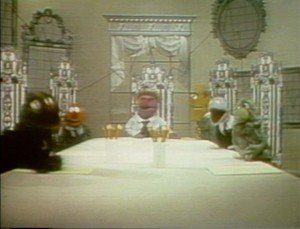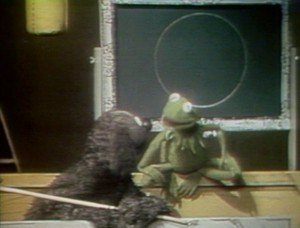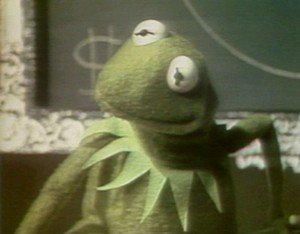Sesame Street Pitch Reel
And, as I said before, Jim was truly intrigued by the concept, and, after then attending another CTW meeting in August of 1968, he finally agreed to join the project. He would contribute new puppets to the show, as well as create a series of short films for it. And once he signed on board, he was fully on board, falling in love with it and eventually coming to think of the show as one of the most rewarding experiences of his career.
The only thing left to do was to give it a name, which caused quite a bit of trouble for CTW, because they didn’t want anything too overly obvious, cutesy, or didactic, and finding that right balance proved very tricky. Finally, Virginia Schone, one of the writers, suggested Sesame Street, which aside from being nicely alliterative, carried with it the idea of opening up new worlds for the kids who watch it, just like “Open Sesame” from the tale of Ali Baba and the 40 Thieves. This name was settled on less than two days before Jim filmed the pitch reel on January 22, 1969, and the difficulty they had in reaching it actually became a running gag in the pitch reel itself.
The pitch reel was intended to demonstrate what this upcoming show would be about to the public television stations that would hopefully be picking it up, and makes for absolutely fascinating viewing today, because when it was filmed, they were very confident about the show and its potential but obviously couldn’t have known just how hugely successful it would be, and now we can view it with 20/20 hindsight and marvel at just how much thought and care was put into it, even from the very beginning. If you’re interested in seeing the pitch reel yourself, it’s included as a bonus feature on the Sesame Street: Old School, Volume 1 DVD set.
It starts off with a brief filmed introduction from Cooney herself, laying out the basic concept of the show and its methodologies, as I’ve explained throughout this post. And then it cuts to the real fun, with a series of comedy bits between the most famous Muppet at that point, Rowlf, who is riotously excited over the idea, and Kermit as his less-enthused sidekick. Interestingly, although Kermit displayed more of his current persona when he was by himself in Hey Cinderella!, here he falls back a bit into the more mischievous role that he occupied before, allowing Rowlf to be the “reasonable” one, so to speak.
But even that isn’t quite accurate. Kermit here actually behaves almost more like a toned-down version of a character that would be one of Sesame‘s most famous, Oscar the Grouch–with similar New Yawkish accent/’tude, such as he displayed in Hey Cinderella!–in that he sardonically undercuts all of Rowlf’s pronouncements about how great the show will be. He takes on the cynical role here, trying to pick holes in every argument, although Rowlf does eventually end up convincing him, like a gentler version of Wilkins/Wontkins. But at the same time, it’s pretty amazing to see Jim use similar methods here that he did for his commercials in order to sell the network on the show and even at times get just as wicked and self-deprecating as he would in those ads.
For example, the pitch reel returns numerous times to a board room full of Muppets–many recognizable from earlier work, such as Scoop, Beautiful Day, the proto-Grover monster who was the middle portion of the three-headed monster in The Muppets on Puppets, and the Anything Muppet who would become Guy Smiley, debating potential titles, each one more ridiculous than the last. Early on, Scoop suggests The 2 and 2 Are 5 Show, and when he’s corrected on his math, he alters it to The 2 and 2 Ain’t 5 Show, and a group collaboration leads to The Itty Bitty Farm and City Witty Ditty Nitty Gritty Dog and Kitty Pretty Little Kiddie Show. Finally, Scoop decides that since this show will be for kids who can’t read or write yet, they should just call it Hey, Stupid!
Since they are all meant to represent a silly version of the CTW heads, it’s particulary impressive that Cooney and Co. were cool with Jim poking fun at them, and that they trusted that the TV people watching would be intelligent enough to be in on the joke. Because, really, this level of self-deprecating edge for a pitch for an educational children’s show is downright remarkable, and in some ways really does foreshadow Oscar, who always undercut any hint of impending sappiness. Also, some of the Muppets at the table are clearly smoking, in a parody of harried executives, but given that this is a pitch for Sesame Street of all things, it feels surreal to say the least. Ah, the 60s!
Kermit additionally pokes holes in Rowlf’s big dreams. “Sounds like it’s gonna be a real smash,” he sarcastically says after observing the Muppet execs. And after watching a brief cartoon about a failed rocket launch that teaches “10, 9, 8, 7, 6, 5, 4, 3, 2, 1,” he cracks, “You not only have a crummy rocket there, you’re gonna have a whole generation of kids counting backwards!” And another time, “You really think you’re gonna get this show on the air?!”



